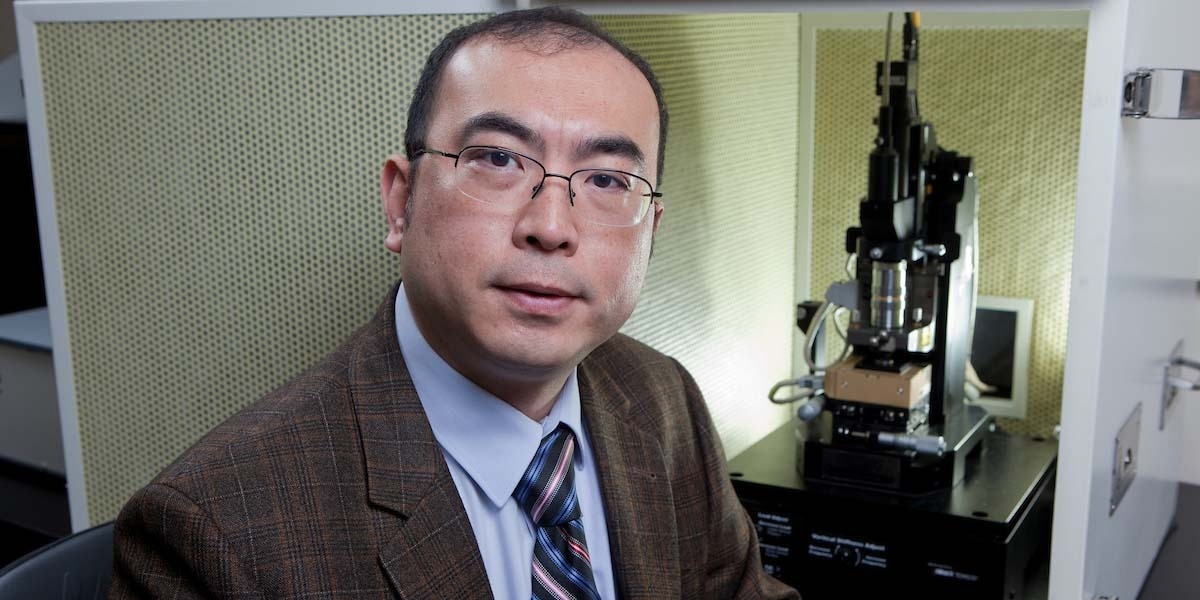Reviewed by Lexie CornerMay 24 2024
An NSF grant is given to Professor Changhong Ke from Binghamton University to explore the possibility of incorporating nanotubes into additively manufactured metals.
 Professor Changhong Ke will investigate the potential of building nanotubes into additively manufactured aluminum to mitigate the effects of corrosion. Image Credit: Jonathan Cohen.
Professor Changhong Ke will investigate the potential of building nanotubes into additively manufactured aluminum to mitigate the effects of corrosion. Image Credit: Jonathan Cohen.
Oxidation can be an engineer's worst nightmare when designing a mechanical system that includes metal. The chemical reaction can impact the device's longevity or efficiency, leading to rust or other issues.
The use of additively manufactured metals has advanced various fields—including automotive, marine, and aerospace—but they are more prone to failure in corrosive environments. Compared to conventionally manufactured metal, the 3D printing process is increased.
What if oxidation could be used to increase the strength of metals? That is the novel concept driving current research at the Thomas J. Watson College of Engineering and Applied Science, Binghamton University.
The National Science Foundation's Early-concept Grants for Exploratory Research (EAGER) program recently awarded Professor Changhong Ke, a faculty member in the Mechanical Engineering Department at Watson College, a $150,000 grant. The grant intends to support novel but potentially ground-breaking research concepts or methodologies.
Ke will investigate the possibility of incorporating nanotubes into additively manufactured aluminum. He believes the material would self-strengthen under corrosive conditions (like moisture and seawater) because of microscopic structures made of boron nitride, a compound commonly used in cosmetics, pencil lead, and dental cement.
You can’t avoid oxidation, so we are trying to take advantage of it by turning it into a new reinforcing mechanism to make the material stronger. That would be something really amazing. People could try to design the materials to include these sorts of porosities or even purposely introducing structures that can be more easily oxidized because it becomes something beneficial instead of harmful to the material itself.
Changhong Ke, Professor and Faculty Member, Mechanical Engineering Department, Watson College, Binghamton University
The nanotubes threaded throughout the metal are a few nanometers thick and a few to hundreds of microns in length. Ke and the team at the Nanomechanics Laboratory will use a force sensor to pull individual nanotubes out of the oxidized metal inside a high-resolution scanning electron microscope, allowing them to watch what is happening in real-time. This will enable them to see how the oxidation affects the way nanotubes bind to metal, which is a critical issue in the self-strengthening mechanism.
We designed this as a sandwich structure. It’s like a hot dog, with the nanotube as the meat and the metal as the bread.
Changhong Ke, Professor and Faculty Member, Mechanical Engineering Department, Watson College, Binghamton University
Researchers will also test the material at a larger scale by examining load transfer to understand how oxidation affects the metal's stiffness, strength, and toughness reinforced with nanotubes. Computational modeling collaborators from the University of Illinois will validate Ke's experimental results because comprehending how any self-strengthening occurs is critical.
We’re hoping this will provide a new perspective to the scientific community about how we view metal oxidation in terms of future material design. That could change the research landscape for these metal materials, particularly for 3D-printed metal. It has so many promising applications in different areas, and it even could revitalize U.S. manufacturing competitiveness.
Changhong Ke, Professor and Faculty Member, Mechanical Engineering Department, Watson College, Binghamton University